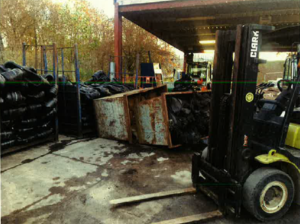Companies fined as worker injured at Pirelli factory
Three companies have been fined after a lift truck engineer was seriously injured while working at Pirelli Tyres’ factory in Carlisle.
Ivan Weightman sustained fractures to his back and leg when two heavy metal skips fell on top of him, trapping the 47-year-old against the ground on 14 November 2019.
Pirelli, International Rubber and Tyre Recycling Limited and DCS Multiserve Limited were all prosecuted by the Health and Safety Executive (HSE) following the incident on Dalston Road. Workers from International Rubber and Tyre Recycling Limited moved materials at the site whereas staff from DCS Multiserve Limited removed waste.
Mr Weightman was servicing a fork lift truck that was parked up against a stack of waste tyres on a stillage. Two metal skips were positioned on top of the stack.

In order to work on the truck, Mr Weightman moved the vehicle a short distance away from the stack.
As he then walked to the front of the truck, which was leased by International Rubber and Tyre Recycling Limited, both skips fell from the stack and trapped him against the floor.
He fractured four lumbar vertebrae, his left femur and was hospitalised for several weeks as a result of the incident.

A HSE investigation found the skips were routinely placed on the tyres so they will be reduced in size prior to them being transported off site. The truck was positioned to stabilise the skips. This improvised working method was approved by Pirelli, and carried out by workers at International Rubber and Tyre Recycling Limited and DCS Multiserve Limited . There had been no effective control over access to the truck and the ignition key was routinely left in the cab. There was a lack of clarity over which contractor was responsible for this activity and as a result no risk assessment had been made and no safe system of work existed.
Mr Weightman said in his victim personal statement: “I used to enjoy going camping, going for walks with my partner and doing a bit of DIY. I had to get rid of my tent, I couldn’t put it up. With all the pain, I struggled to do it.
“I can’t go for walks like I used to. It starts to get uncomfortable and painful.
“I struggle coming down the stairs with my left knee. I struggle to get comfortable in bed or when sat on the sofa. My left knee gives way sometimes, like when I am carrying a heavy shopping bag.
“I can’t play with my grandson, who is five, and I won’t be able to play with my great nephew when he is older.”
Pirelli Tyres Limited, of Derby Road, Burton-On-Trent, Staffordshire, pleaded guilty to breaching Section 3(1) of the Health and Safety at Work etc. Act 1974 and Regulation 11(1) of the Management of Health and Safety at Work Regulations 1999. The company was fined £280,000 and ordered to pay £4,703.43 in costs at Carlisle Crown Court on 10 May 2024.
International Rubber and Tyre Recycling Limited, of Moorhead Lane, Shipley, West Yorkshire, pleaded guilty to breaching Section 3(1) of the Health and Safety at Work etc. Act 1974 and Regulation 11(1) of the Management of Health and Safety at Work Regulations 1999. The company was fined £9,000 and ordered to pay £4,566.13 in costs at Carlisle Crown Court on 10 May 2024.
DCS Multiserve Limited, of Mylord Crescent, Camperdown Industrial Estate, Newcastle, pleaded guilty to breaching Regulation 11(1) of the Management of Health and Safety at Work Regulations 1999. The company was fined £2,600 and ordered to pay £15,000 in costs at Carlisle Crown Court on 10 May 2024.
HSE inspector Matthew Tinsley said: “The fines imposed on these companies should be a warning to those responsible for the effective management of contractors and effective supervision of employees that the courts, and HSE, take a failure to follow the regulations extremely seriously. It also highlights the risks of improvised work methods using unsuitable equipment. HSE will not hesitate to take action against companies which do not do all that they should to keep people safe.”
This HSE prosecution was brought by HSE enforcement lawyer Nathan Cook and supported by HSE paralegal officer Louisa Shaw.
Notes to Editors:
- The Health and Safety Executive (HSE) is Britain’s national regulator for workplace health and safety. We prevent work-related death, injury and ill health through regulatory actions that range from influencing behaviours across whole industry sectors through to targeted interventions on individual businesses. These activities are supported by globally recognised scientific expertise.
- More information about the legislation referred to in this case is available.
- Further details on the latest HSE news releases is available.




